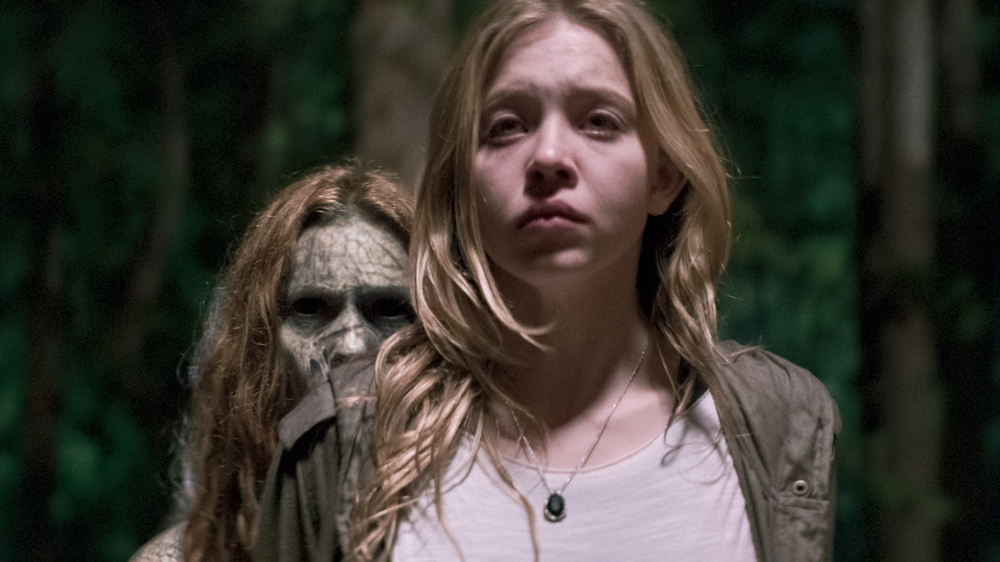Film Review: ‘Along Came the Devil’
By Dennis Harvey
LOS ANGELES (Variety.com) – The budget may be low, but the level of scares and imagination are lower still in “Along Came the Devil,” a feeble indie horror film that sometimes seems like a straight retread and other times feels like a movie aimed specifically at Christian audiences. Either way, it creaks more than it creeps, to the extent that various scenes appear to be missing from director Jason DeVan’s disjointed debut. Uninspired and increasingly silly, the Atlanta-shot movie will strike most genre fans as overly derivative, while the moderate amount of cursing and gore (however unconvincing) will nevertheless be more than faith-based-entertainment seekers typically find palatable. Gravitas Ventures is giving the picture a limited theatrical launch Aug. 10, simultaneous with on-demand/digital HD release.
Warning bells go off immediately as the film starts with far too much explanatory text, a ham-fisted childhood flashback and the de rigueur claim: “Based on true events” (though if this movie is based on anything, it’s William Friedkin’s original 1973 “The Exorcist,” whose ideas are at times quite shamelessly copied).
Ten years later, high-schooler Ashley (Sydney Sweeney) has been taken in by Aunt Tanya (Jessica Barth). Ashley’s abusive father is now dead, older sister Jordan has just gone off to college, and their mother has long since mysteriously disappeared. Niece and aunt move back to the newly separated sisters’ home town, where Ashley reunites with the girl who was her best friend (Madison Lintz’s Hannah) and the boy who crushed on her (Austin Filson’s Shane) when she was but a wee tot.
Unfortunately, she’s also reunited with the dark force that may have caused the disappearance of her mom (producer/co-scenarist Heather DeVan). It begins manifesting itself in rote fleeting-shadow jump scares underlined by soundtrack triggers. After dreaming that this demon has entered her bed, Ashley suddenly begins dressing and acting “slutty.” Yet before she can wander too far down the path of promiscuity, the possession takes a more Linda Blair-like turn that attracts the ministrations of Pastor John (Matt Dallas) and his superior, Reverend Michael (Bruce Davison), the latter an expert in the realms of demonology and exorcism.
We do get to peep at the incarnation of the offending Satan, who arrives in traditional form as a dude in a hairy leotard with horns and glowing eyes. But the eventual violent deaths he/it causes take place off-screen, and the few unrelated instances of gore are laughable.
There are several clumsy transitions, most notably when characters at school excitedly tell Ashley “what just happened” — we have no idea what they’re talking about, suggesting an important sequence abandoned. Other confusing decisions include a sequence shot as if by a surveillance camera trained on Ashley’s bed when there’s no reason why her room would be under surveillance.
The abrupt, premature-feeling ending is one more factor that makes it hard to tell whether the film’s faults are due more to ineptitude or to production woes. It’s also difficult to figure how seriously “Devil” means to take its religious angle, as there’s more talk of faith than usual for a genre film, but it’s very superficial. And the story content (including the relative ineffectiveness of clergy against an evil foe) often seems like a bad fit for churchgoing viewers.
Certainly the script’s hokey dialogue and clichéd situations suggest some wobbly captaining of this leaky ship, as do the uneven performances. (As the angsty senior cleric, Davison is in a different league than his fellow cast members, but the material he has to work with isn’t exactly “First Reformed” — or William Peter Blatty, for that matter.) Modest yet highly variable effects aside, the tech/design contributions are a little more consistent, with by far the biggest plus being the reasonable surface gloss Justin Duval’s widescreen lensing provides.

